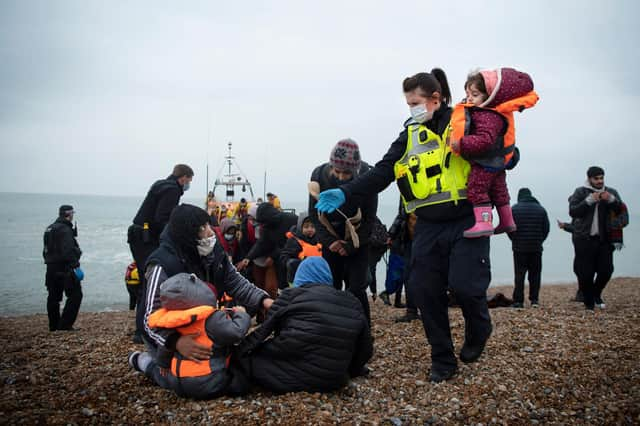As world enters Age of Migration, the UK needs take a new approach that's generous to truly needy refugees but swiftly deports illegal economic migrants – Dr Azeem Ibrahim


The Home Secretary, Suella Braverman, has been fiercely criticised for calling migration an “invasion”. Barbs fly this way and that, and her job is under pressure. But a war of words obscures the epochal change we now confront.
Migrants risk death or capture as they float across the icy English Channel in the beginnings of a hard winter. They have paid the people traffickers fortunes, and are ready to take their chances.
Advertisement
Hide AdAdvertisement
Hide AdWe appear to be reaching a point of inflection and crisis. This is because we live at the beginning of what will become an Age of Migration. Millions will move between countries. Many will try to come to Britain. But Britain simply cannot take, house and educate them all.
Instead, we must change our refugee and immigration policies to address this change. We need to focus on improving the lives of people where they are as a first priority – so they do not feel the need to make dangerous, expensive journeys across the planet.
This Age of Migration will be powered by demographic change. It is an immense, inexorable thing. And it will be a profound challenge. The future will be determined by where population increases happen.
Those places whose populations are due to increase the most are also the areas least able to handle the results of population growth. Ethiopia and Yemen are countries where awful civil wars are ongoing. Their populations are set to double. In the Democratic Republic of the Congo and Afghanistan – not exactly stable, well-governed countries where people want to live – things are looking even more significant. Their populations will soon triple, according to demographers. Those people will find opportunities lacking and governments oppressive. They will move – and they will be joined by others from across the developing world.
I have spent much of my life studying political and violent causes that make people become refugees. I have studied genocide in particular for a long time. My research predicted the 2017 genocide of the Rohingya in Myanmar, and has broken ground on the genocide of the Uyghurs in China’s Xinjiang province. My think tank, the New Lines Institute, has closely studied the Russian war in Ukraine and produced a legal paper that determined that it is a war of genocide.
Further to this, I have seen poverty, destitution and genocide at close hand. I have travelled to Myanmar; to the Isis-infested refugee camps inside Syria and outside Syria, in Jordan; and into shattered Ukrainian cities. I have seen both suffering and squalor.
These are the roots of mass migration. But independent of them, Britain’s migration situation is out of control. The situation will only get more complex and difficult as time passes.
Britain sees too many new arrivals claiming to be refugees when they do not meet that status. Many of the current wave seem to be Albanians. There is no current civil war, and no genocide, in Albania. Their economic migration does huge damage to legitimate asylum seekers. They’re mostly men, who are young and strong. They seem to have the money to move.
Advertisement
Hide AdAdvertisement
Hide AdCompared to that, other people are inevitably crowded out. What chance does a young woman – a victim perhaps of sexual violence and genocide in Tigray, Ethiopia – have of paying tens of thousands of pounds to have herself trafficked to Britain? In reality, she – a person we should try hardest to help – has virtually no chance of arriving in Britain.
The government should minimise illegal and economic migration by deporting immediately those who are not fleeing persecution in favour of helping the people who most need our help. Our approach must be generous in the right places.
The other side of this coin is creating a fast-track programme to take truly needy refugees directly from sources of conflict. It is possible – we have done it, and we can do it again. We can create a series of urgent hotspots where people are most at risk, and give them all the help we can to come to Britain and to start new lives here with confidence.
We did it for Ukraine with the resettlement scheme, which placed thousands of Ukrainian families with British families in record time. We did it for Hong Kong, one of the great unheralded successes of the Home Office in recent years. These groups should be joined by people from Myanmar, Uyghurs from China, those from Tigray, Syria – all of them given priority.
And globally, Britain has a role to play. We have expertise and talent in development, and a unique role to play as financial and banking capital of the world. For too long Britain has paid lip service to a growing global crusade against kleptocracy. As Putin’s tanks rolled into Ukraine we changed our tack rapidly, and to the government’s credit. We can and must go further.
That means tackling corruption in some of the resource-rich countries where the elites simply steal everything. If we can do this, it will diminish profoundly the factors which drive mass migration. It might end much of the Age of Migration before it begins.
It would be the challenge of a generation, but we can do it. It is better than seeing migrants drown in the English Channel, and arguing endlessly in Parliament about how to refer to those who land their small boats near Dover.
Dr Azeem Ibrahim OBE is founder and executive chair of the Scotland Institute and director of the New Lines Institute for Strategy and Policy
Comments
Want to join the conversation? Please or to comment on this article.